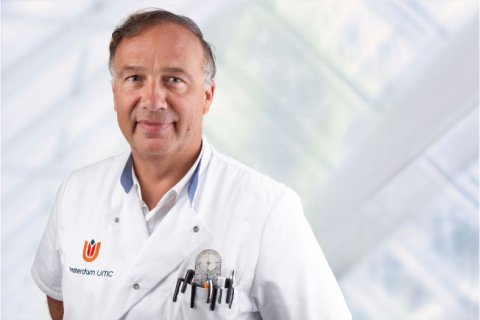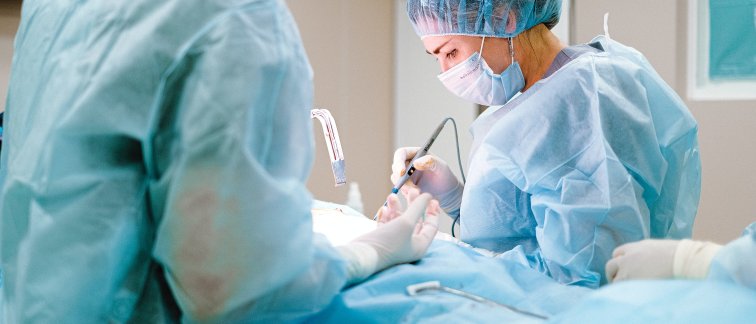“Corona has had preferential treatment in healthcare for too long”, argues Armand Girbes, head of intensive care VUmc at Amsterdam UMC in response to research by the RIVM. This shows that postponing non-acute operations in 2020 and 2021 has cost at least 320,000 healthy years of life. Armand Girbes shares his view on this topic during an interview with Nederlands Dagblad.
320.000 years of life
'320,000 years of life' is an abstract number. What does it tell you?
“That means we are talking about ten years of life for 32,000 people. I think that's quite a lot. And it is the tip of the iceberg. The RIVM has done an analysis on the dates of delayed surgery. I'm sure they've researched that very well, but there's also other damage.
Think of someone who is not feeling well with vague complaints, cannot go straight to the hospital because of the corona related pressure and therefore only gets a serious diagnosis later. Because of the late diagnosis and late treatment, the chances of a favorable treatment course can be considerably reduced. Or think of someone who is waiting for a knee replacement; many people will say: that can wait. In the meantime, that person can move less, which causes their condition to deteriorate, and therefore they run a greater risk of something like thrombosis and a fatal pulmonary embolism. Situations like that are not easily picked up in the study of RIVM, which focused specifically on postponed operations.”
Significant damage from delayed care
The damage from delayed care is significant. Should care be organized differently to avoid this in subsequent corona waves?’
“We need to stop making a difference between corona and non-corona patients. I understand that in March 2020, all the focus was on corona care. Soon I found that this is at the expense of other care to an excessive degree. There is scarcity in care: there are more people who wish to use it than is possible. That's why the rule in healthcare is to look as fairly as possible at who benefits from care.
So you help the people who have the best chances of recovering through treatment and who can have healthy years of life. For the past two years, priority has always been given to corona patients without regard to the harm it will do to the other patients.”
Consequences
But if that had not been done, more people would have died of corona.
"It's hard to talk about that, but you have to die of something. My father is 87. If he gets corona, he'll probably die. I could keep him alive longer in intensive care and thereby stretch his life a little. In the end, he would probably die of corona anyway. When you are older and weaker, you are more likely to die of something. Of course it is nicer to say that no one should die of corona and we are doing everything we can to prevent it.
However, that's just not realistic and we have to find the right balance in how to take care of all patients. Today we are seeing some of the harmful consequences for the non-corona patients.”

healthcare for too long”.
More beds and more staff
Do you not accept the situation too easily? You could also do something about the scarcity. More beds and more staff, for example.
“There is a lot of discussion about it since corona. That doesn't lead to change. Reports by chatty people don't solve anything. I find it significant that the RIVM now advises Health Minister Kuipers to enter into talks with private clinics and foreign hospitals to take over surgeries. The RIVM is actually saying: we have it so badly organized that we have to do business with foreign hospitals. I call that a testimonium paupertatis, a testimony of poverty.”
The RIVM
What should the RIVM recommend, in your opinion?
“Even before corona there was scarcity in health care and nothing fundamental has been done about it. In recent years we have talked a lot about additional staff in healthcare. Yet nowhere have I seen a campaign or ideas to make the work more attractive. In healthcare, many people work on the bureaucracy instead of at the bedside. So that doesn't help the patient. I understand the negative image people have of healthcare work, but my advice would be to try to do something about it.”
Continue to work with mild corona complaints
For the time being, staff shortages will remain a problem, especially with caregivers dropping out repeatedly because they have corona. Is it an idea to allow staff with mild corona complaints to continue working?
“A basic principle in healthcare is that you don't harm patients. I would hate for someone to come in for knee surgery, get corona by a caregiver and die as a result. You can have it mild yourself, that doesn't mean that patient will get it mildly. At the same time, it sometimes happens that staff members here in intensive care unexpectedly have corona. Then I'm always glad that we wear a mouth mask as standard when we're near patients, so the consequences aren't so bad. I think working through mild corona symptoms is a tricky issue that we do have to talk about to find the right balance.”
Curious to learn more about the research program of RIVM? Read the article (in Dutch) here.
Source: read the original (Dutch) article by Jasper den Boon in Nederlands Dagblad here.

